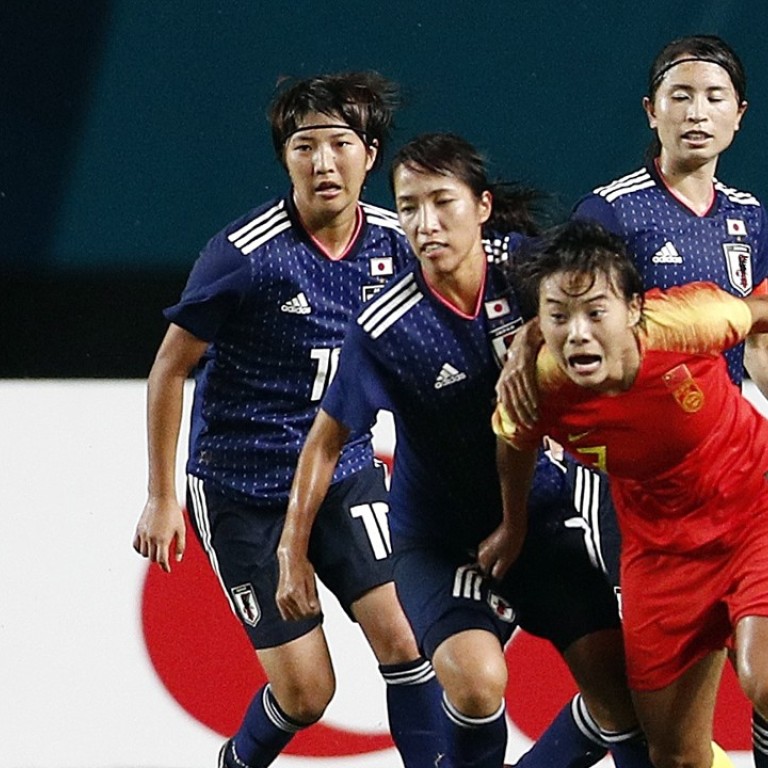
Wang Shuang’s PSG debut goal shows China’s women are leaving Marcello Lippi’s overpaid failures in footballing shade
China boss Marcello Lippi sees his staggering salary questioned as latest hand wringing takes aim at an ageing men’s team after loss to Qatar, while women’s national team goes from strength to strength
Fresh from starring for the women at the Asian Games in Indonesia, Wang Shuang made her debut for Paris Saint-Germain Femenines and scored in a win over city rivals Paris FC.
That came on the same weekend the men’s national team lost to Qatar as they begin preparations for the Asian Cup in January.
In fairness there were a few new faces in an experimental side picked by Marcello Lippi, but fairness is not what Chinese social media specialises in and questions are being asked.
The headlines on Sina Sport were all of a similarly desperate nature and did not pull any punches.
China’s veterans were captained by 38-year-old Zheng Zhi, with Beijing Guoan’s Wei Shihao the only 23-year-old in the 23-man squad.
This was in stark contrast to the Qatar side, which is much younger and saw eight of the starters picked from AFC Champions League quarter-finalists.
China’s 23-man squad had only four players from Tianjin Quanjian, the Chinese Super League’s sole remaining representative in the competition. None of them started.
Lippi’s line-up was rightly ridiculed and left many asking how China can qualify for the World Cup in Qatar.
The Italian’s staggering wages of US$28 million a year have also been called into question and the likelihood of his contract being renewed thrown into doubt.
Then again, “seriously broken” was another headline’s view of Chinese football that stated it’s “useless to change the coach”.
The hand wringing seems more pronounced than usual.
An aged coach that has an overreliance on Evergrande’s ageing stars, the foreign players in the league being too strong or too few Chinese children out playing football, a failing of the Chinese FA’s under-23 rule – whatever the argument, the comments have one thing in common: why are China’s men so much worse than the women?
Wang signed for PSG last month and made her debut on Sunday in the French women’s league.
Where the likes of Zhang Yuning moving to Chinese-owned West Bromwich Albion last summer are seen only with cynicism, Wang’s move is the opposite.
Scoring a goal and winning a penalty, Shuang provided an immediate impact and gave proof that she belongs at this level.
The 30-yard strike put them 2-0 up and the penalty secured a 5-0 lead before Wang went off after 68 minutes with the job done.
Not a bad statement of intent, especially since she only arrived in Paris last week after playing in the Asian Games for the Chinese national team that finished runners-up to Japan after a last-minute goal decided the final.
Wang has carried her Asian Games form into her new club.
She hit a hat-trick against Thailand in the quarter-final, scored in the win over North Korea in the last group game, grabbed another in the 16-0 win over Tajikistan and opened the scoring in the 7-0 win over Hong Kong.
And she can expect to continue in the same vein in France.
Much like China are expected to dominate most of the AFC nations, PSG are expected to dominate most of the league.
The exception – the Japan to PSG’s China – are Olympique Lyonnais Feminin, the European champions for the third time in a row last season, a record fifth title. They won the league last season too, and have topped that a record 16 times.
Unlike the men’s equivalent, PSG are not a shoo-in for the title and they finished eight points behind Lyon last season.
In contrast, Zhang could not get a game on loan at Wolfsburg last season and has gone back to the Eredivisie, where he was previously with Vitesse Arnhem, on loan to ADO Den Haag.
He’s yet to play for his new club having missed preseason on Asian Games duty and then not making the squad for the opening game of the league season before the international break.
It’s a step backwards but undoubtedly the right move for his career if he’s to fulfil his potential. It’s also indicative of the comparative levels of China’s men’s and women’s team.
While Wang has slotted seamlessly into one of the strongest women’s teams in club football, Zhang – the only Chinese footballer in a foreign league of note – is nowhere near.
More of Wang’s teammates could follow her to Europe, but the same is not true for Zhang.
Of the China team that lost to Qatar on Friday night, Zhang Linpeng and Wu Lei have been linked with moves to the English Premier League and Zheng Zhi has played there, but you can’t help but feel that they have mostly missed the boat.
There was no place for Jiangsu Suning’s Huang Zichang in this squad, presumably on account of his Asian Games exploits, but he is one of a handful of younger players in and around the full national team that might be good enough of the current generation.
Whatever is to blame for that – and the debate will rage on – that’s something that needs to change before China’s men get anywhere near its women, or a World Cup.

